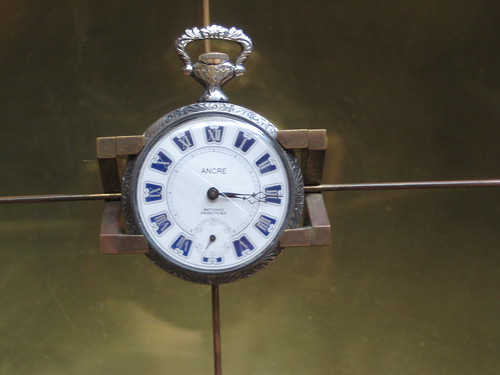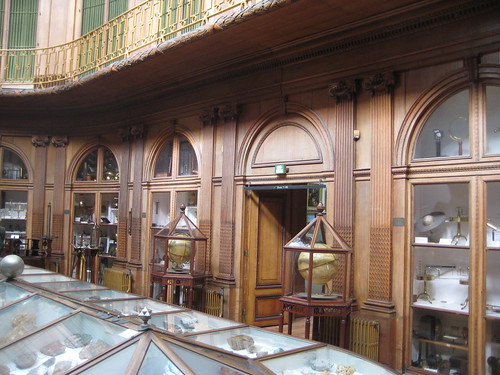
A brief train ride brought me to Haarlem, a small city, older than Amsterdam, and beautiful. It seemed at first to be all shops: bland, modern, expensive things. Their content may have bored me, but the buildings themselves certainly did not; even the McDonald's was ensconced in an architectural work of art, something from the early 1600s. I wondered for a moment if it were blasphemous, and decided that the degree to which I enjoyed the idea likely indicated that yes, it was.
I'd heard tell of an old science museum there. I enjoy such things a great deal, so I hoped that I might run into it. While wandering one of the canals I stopped to admire a truly grand building, and I took three pictures before I noticed the flag bearing the name of the museum for which I had vaguely been looking.
The outside was a suitable shell. The inside was spectacular. I entered into a room of marble, columns, and stately wood, flanked by classical statues and carvings of cherubs engaged in the sciences and the arts. (That ever there was a culture that could make a representation of such a thing not only appear to be serious, but even noble, is delightful. Score one for humanity.) It contained a ticket and information desk that looked as if it belonged there. Such a thing is no small feat for a museum. In fact, I doubt I'd ever seen it correctly executed before. It looked into a round chamber capped with a dome, warm, glowing, and golden. Next one comes upon the museum proper, beginning with the natural history section, then rooms devoted to antiquated scientific instruments, followed by two art galleries. It was another one of those private collections that eventually became a museum proper.

With every new space I entered I gasped, not only impressed, but actually moved. I've never seen a museum I loved so instantly, so intently. Not only the collection, but also the space itself, were everything I could have asked such a place to be: gentlemanly, tasteful, inspiring, and beautiful. I photographed everything. I wanted desperately to give you some sense of the place, so thrilled was I to find it. This place moved beyond simply archiving certain achievements of human culture, a high aim in itself. It became one of those achievements. It was a palace of art.
I found this place on the day on which the Large Hadron Collider was first activated.
I enjoy the LHC as a symbol as much as I appreciate its use as a tool. I'm pleased with the panic into which it seems to have thrown some people, and not simply because it is amusing. It is very human, I think, not only to fear the end of all things, but to expect to see it. Every generation has its apocalypse, it's ever-present threat of destruction. We anticipate some distant failure or attack; we wait to be important and frightened and final. I might be so bold as to suggest that our fear is a longing for a personal and internal spiritual destruction. We want to be confronted with something immense, alien, and devastating, to be laid bare by it, scraped to the bones. We want to fight it, or be taken or changed by it. Surviving the zombie invasion and being taken in the rapture mean the exact same thing. To expect it to be an external, collective thing, indeed, to expect it to be done to and for us, strikes me as slightly childish, but perhaps I oughtn't judge.
The fear surrounding the Large Hadron Collider is warranted, not because it might destroy the world, but because it might destroy the universe as we know it. This is the same fear felt when the earth lost its place at the centre of a created, clockwork dome, and when the sun became another small star. And I do propose that such fear is legitimate. I hesitate to describe science as truth. The frequency with which it is replaced and augmented and endlessly perfected and scrapped and perfected in some other way demonstrates that it isn't truth as much as it is a particular narrative, or the best we can do at the time. And that is precisely why it is so terrifying. Science means admitting that we are not searching for truth, that we cannot search for truth. It means peeling back the veil to learn the smallest of things. It means dedicating lives, obliterating ourselves again and again, to discover minutia that will certainly one day be replaced, and then be replaced again. I can think of few pursuits more worthwhile, and admirable.
And obviously, modern science having constructed a great circle with which to raise up energies that will help us to cross boundaries humans were not meant to cross, to peek into the inner workings of all things, to risk destruction in the name of knowledge, would appeal to me.
Still, I think something is lacking. My fascination with antiquated science relates once more to the spirit of these faded enterprises rather than their usefulness. These are artefacts from a time when brilliant men, dabblers, collectors, and scientists, sought not simply to probe, but to seduce a mysterious universe into revealing its hidden charms. Modernity disappoints me. I still cannot bring myself to silence my repeated complaint: given the systems and materials required to produce things with an ease never before known to the world, we've turned to ugliness, to functionality and nothing more. Science was beautiful once. It was carried out with the use of pretty devices. Specimens were gathered not simply to be labelled. They proclaimed that the complexity and variety of the natural world rivals our art, but that arranging them and displaying them and attempting to understand them could be an art in itself.
I returned to Amsterdam that evening in order to visit the absinthe bar where I intended to raise a glass or seven to science. It was a dark place, underground, and nearly empty when I arrived. It only meant that I quickly befriended the Surinamese barkeep and the other patron, a gentleman from Jakarta. As the place filled up I somehow managed to remain the closest thing to a lady present. So I spoke to nearly everyone there, and enjoyed it a great deal. The flame and sugar filled concoctions with which I toasted the Large Hadron Collider's first adventure were often bought for me, as a result. Of the several varieties available my favourite by far was a caramel flavoured absinthe, which sounds improbable, but was actually delicious.

No comments:
Post a Comment